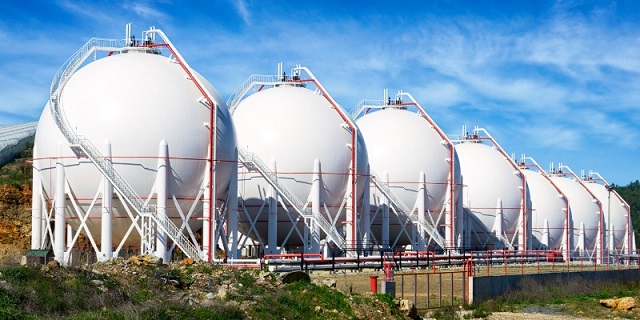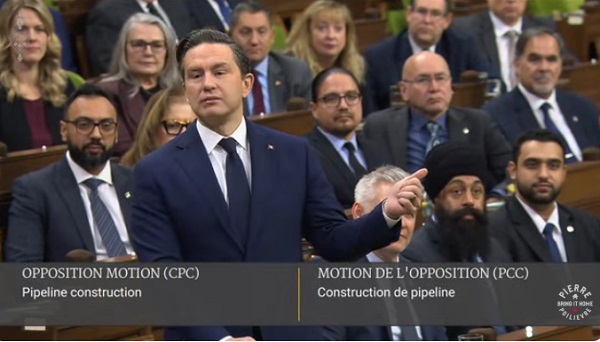Energy
Federal government continues to reject golden opportunities to export LNG

From the Fraser Institute
By Julio Mejía and Elmira Aliakbari
A recent report released by the National Bank of Canada underscores the potential environmental impact of transitioning from coal to natural gas in countries such as India. According to the report, by 2030 the cumulative effect of this transition would result in up to four times fewer greenhouse gases emissions than what Canada emitted in 2021.
Once again, Canada has missed a crucial opportunity to supply clean and reliable energy to an ally. Polish President Andrzej Duda recently expressed interest in purchasing Canadian liquefied natural gas (LNG) from Canada but the Trudeau government did not offer any concrete commitment in response. We’ve seen this movie before.
During his recent visit to Ottawa, Greek Prime Minister Kyriakos Mitsotakis received the same noncommitment. In January 2023, Japanese Prime Minister Fumio Kishida came to Canada hoping to secure a reliable energy source. In response, Trudeau expressed the importance of Canada as a global energy supplier, only to add the disclaimer that the world is “aggressively” moving towards decarbonization. And in 2022, after Putin’s invasion of Ukraine led Germany to seek ways to reduce its reliance on Russian energy sources, German Chancellor Olaf Scholz asked to buy Canadian LNG but the prime minister gave him the cold shoulder. Apparently, Trudeau found no compelling “business case” to export LNG to Europe’s largest economy.
Of course, Canada’s vast natural resources could make a significant positive impact on global energy security, reliability and emissions reduction by reducing reliance on coal while also creating jobs and economic opportunity here at home. Energy supply shortages have already forced European countries to revert to coal-fired power plants—coal contributes more CO2 emissions per unit of energy than natural gas. In the developing world, India aims to double coal production by 2030 to meet the demands of its burgeoning economy and population. Similarly, China quadrupled the amount of new coal power in 2022 and has six times as many plants under construction as the rest of the world combined.
A recent report released by the National Bank of Canada underscores the potential environmental impact of transitioning from coal to natural gas in countries such as India. According to the report, by 2030 the cumulative effect of this transition would result in up to four times fewer greenhouse gases emissions than what Canada emitted in 2021. To put that in perspective, the impact would be even bigger than completely shutting down the Canadian economy.
Moreover, a recent McKinsey report anticipates an annual increase in global LNG demand of 1.5 per cent to 3 per cent by 2035. And according to the latest report by the International Energy Agency (IEA), limited new LNG production means supply will remain tight. The Biden administration recently halted LNG project approvals, increasing the need for Canada to establish its own infrastructure if we’re to seize the opportunity and become a global LNG supplier.
Unfortunately, Canada currently has no operational LNG export terminals, with the first LNG facility expected to commence exporting by 2025. The Trudeau government has frustrated the development of other LNG terminals, primarily through government regulatory barriers including long approval timelines. The government’s emissions caps on the oil and gas sector and federal Bill C-69 (which added more red tape and complexity to the assessment process for major energy projects) have also created uncertainty and deterred—if not outright prohibited—investment in the sector. Additionally, the British Columbia government’s “CleanBC” plan to reduce greenhouse gas emissions has added more regulation. Not surprisingly, a recent survey revealed that investors identify regulatory uncertainty as a major deterrent to investment in Canada’s oil and gas sector.
With the proper polices in place, Canada could provide an energy alternative to our allies and other coal-consuming countries worldwide. The Trudeau government should acknowledge the environmental benefits of our natural gas resources, reform regulations for energy infrastructure projects so they’re more competitive, and allow our energy industry to be a leading source of clean and reliable energy, for the benefit of Canadians and the environment.
Authors:
Business
Looks like the Liberals don’t support their own Pipeline MOU

From Pierre Poilievre
Alberta
They never wanted a pipeline! – Deputy Conservative Leader Melissa Lantsman

From Melissa Lantsman
Turns out the anti-development wing of the Liberal Party never stopped running the show.
Today, we’ll see if the Liberals vote for the pipeline they just finished bragging about.
Spoiler: they won’t. Because with the Liberals, the announcements are real, but the results never are.
-

 COVID-192 days ago
COVID-192 days agoUniversity of Colorado will pay $10 million to staff, students for trying to force them to take COVID shots
-

 Bruce Dowbiggin2 days ago
Bruce Dowbiggin2 days agoIntegration Or Indignation: Whose Strategy Worked Best Against Trump?
-

 espionage2 days ago
espionage2 days agoWestern Campuses Help Build China’s Digital Dragnet With U.S. Tax Funds, Study Warns
-

 Bruce Dowbiggin2 days ago
Bruce Dowbiggin2 days agoWayne Gretzky’s Terrible, Awful Week.. And Soccer/ Football.
-

 Agriculture2 days ago
Agriculture2 days agoCanada’s air quality among the best in the world
-

 Business1 day ago
Business1 day agoCanada invests $34 million in Chinese drones now considered to be ‘high security risks’
-

 Health2 days ago
Health2 days agoCDC Vaccine Panel Votes to End Universal Hep B Vaccine for Newborns
-

 Business2 days ago
Business2 days agoThe EU Insists Its X Fine Isn’t About Censorship. Here’s Why It Is.








